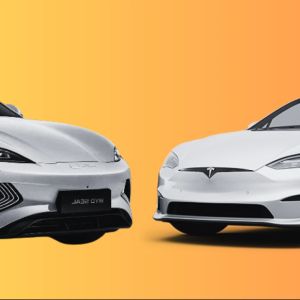Europe’s EV dream now has a Made-in-China sticker
3 min read
Chinese electric carmakers have grabbed a serious slice of Europe’s most EV-obsessed market, and no one’s stopping them. Since January 2020, when the first MG rolled into Norway, Chinese brands have gone from unknown to unavoidable. Beijing’s pricing strategy and tech have pushed China’s EV makers to about 10% market share in Norway alone, as reported by CNBC . That happened in less than five years. Norway isn’t just another country. It’s the continent’s EV playground, with electric cars making up 94% of new vehicle sales in the first half of 2025. Yes, 94%. Unlike the U.S. or EU, which have both hit Chinese EVs with tariffs to protect homegrown brands, Norway’s made it clear it has no plans to do that. A spokesperson from Norway’s finance ministry wasn’t available for comment, but the stance hasn’t changed — no tariffs, no restrictions, no problem. Norway becomes China’s test site At least 20 Chinese electric models are now sold across Norway. Christina Bu, who leads the Norwegian EV Association, says buyers no longer hesitate. “They see that [they are] good cars, technologically they are good and also quite competitive when it comes to price,” Christina told CNBC. She says the local view has “changed a lot.” These vehicles aren’t seen as knockoffs anymore, they’re just another choice in an already crowded market. Brands like BYD, XPeng, and MG have broken into Norway’s top 20 car sales rankings. Volvo and Polestar are there too, but don’t count under the “Chinese brand” category, even though they’re linked to Geely, a Chinese holding company. That distinction comes from Felipe Munoz at JATO Dynamics, who told CNBC that he only counts vehicles that are “fully designed, conceived and produced in China.” So that excludes European-rooted companies with Chinese investment. Using Felipe’s definition, China’s EVs controlled 10.04% of Norway’s market between January and June 2025. Felipe calls Norway “Europe’s laboratory” for electric vehicles, a place where foreign brands can test their products without blowing millions. “It is easier to start there than anywhere in Europe and does not require big investments as in Europe’s big 5 markets,” he said. The country’s lack of its own car industry makes it even easier. There’s no one to offend, no legacy automakers to fight with. Tesla still holds the top spot, with its new Model Y keeping demand high in June. But Chinese brands are closing in. And they’re not doing it with flash or ads, they’re offering low prices, competitive features, and fast rollouts. People want practical cars that work and don’t cost a fortune. China is giving them that. Tesla, on the other hand, has to find ways to stay ahead while its rivals scale up. China challenges the West’s EV control That challenge is growing. Rico Luman from ING Bank, who follows transport and logistics, says European drivers enjoy driving Chinese EVs. That’s bad news for companies like Tesla or Volkswagen, which are trying to hold onto their shrinking piece of the pie. “So, that is a real challenge for Tesla going forward,” Rico said on CNBC’s Squawk Box Europe . “To compete with those new brands which are building up their presence in Europe.” When asked if Europe is falling behind, Rico didn’t sugarcoat it. “Europe is catching up a bit,” he said. But the lead still belongs to China. And the U.S. isn’t winning either. Rico pointed out there’s been “some backtracking” stateside, leaving Europe stuck somewhere in the middle. No one’s pulling ahead fast, but China’s already lapping the field. “We really need more new models and more affordable models to convince the middle-class driver to make the shift, and we’re not there yet,” Rico added. That’s the core of it. China’s strategy isn’t about luxury or hype. It’s about volume. It’s about affordability. And right now, it’s working. Norway shows what happens when Europe keeps the door wide open. Beijing doesn’t need to force anything. The market’s already letting them in. Cryptopolitan Academy: Want to grow your money in 2025? Learn how to do it with DeFi in our upcoming webclass. Save Your Spot

Source: Cryptopolitan



